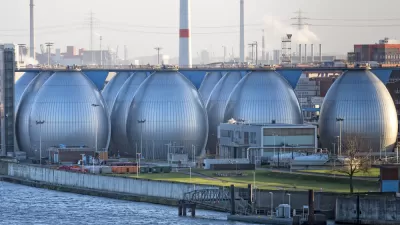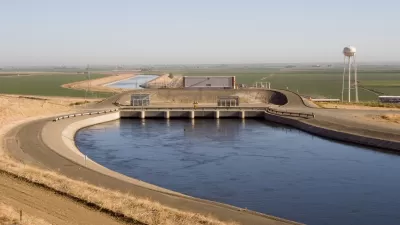With an historic drought pressuring agencies to source more water locally, the Metropolitan Water District is looking to expand an idea pioneered by its neighbors in Orange County.
"The Metropolitan Water District of Southern California is in talks with Los Angeles County sanitation districts about developing what could be one of the largest recycled water programs in the world," reports Matt Stevens.
MWD staff has already presented a "draft framework of a plan to purify and reuse as much as 168,000 acre-feet of water a year – enough to serve about twice that number of households for a year." Such a plan would require a new treatment plant and delivery facilities likely to cost in the realm of $1 billion.
The article goes into a lot of detail about how recycled potable water systems work, including examples available just to the south of Los Angeles County in Orange County. There, an indirect potable reuse system purifies water in an underground aquifer. The Orange County Groundwater Replenishment System can purify up to 100 million gallons of water per day. In their draft report, MWD officials targeted 150 million gallons per day, which would make the system the largest in the world.
As for next steps, Stevens reports that following a still-needed board approval "the agencies could launch on a 'demonstration project' at the sanitation districts’ Joint Water Pollution Control Plant in Carson in about 20 months. There, the treatment processes would be perfected on 1 million gallons of water per day while officials conduct additional studies and develop a financing plan, according to an MWD memo."
FULL STORY: California seeks to build one of world's largest recycled water programs

Study: Maui’s Plan to Convert Vacation Rentals to Long-Term Housing Could Cause Nearly $1 Billion Economic Loss
The plan would reduce visitor accommodation by 25% resulting in 1,900 jobs lost.

Alabama: Trump Terminates Settlements for Black Communities Harmed By Raw Sewage
Trump deemed the landmark civil rights agreement “illegal DEI and environmental justice policy.”

Why Should We Subsidize Public Transportation?
Many public transit agencies face financial stress due to rising costs, declining fare revenue, and declining subsidies. Transit advocates must provide a strong business case for increasing public transit funding.

Paris Bike Boom Leads to Steep Drop in Air Pollution
The French city’s air quality has improved dramatically in the past 20 years, coinciding with a growth in cycling.

Why Housing Costs More to Build in California Than in Texas
Hard costs like labor and materials combined with ‘soft’ costs such as permitting make building in the San Francisco Bay Area almost three times as costly as in Texas cities.

San Diego County Sees a Rise in Urban Coyotes
San Diego County experiences a rise in urban coyotes, as sightings become prevalent throughout its urban neighbourhoods and surrounding areas.
Urban Design for Planners 1: Software Tools
This six-course series explores essential urban design concepts using open source software and equips planners with the tools they need to participate fully in the urban design process.
Planning for Universal Design
Learn the tools for implementing Universal Design in planning regulations.
Smith Gee Studio
Alamo Area Metropolitan Planning Organization
City of Santa Clarita
Institute for Housing and Urban Development Studies (IHS)
City of Grandview
Harvard GSD Executive Education
Toledo-Lucas County Plan Commissions
Salt Lake City
NYU Wagner Graduate School of Public Service




























